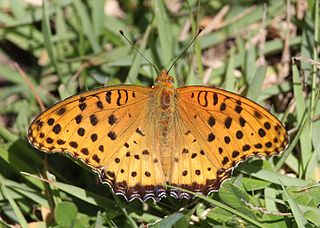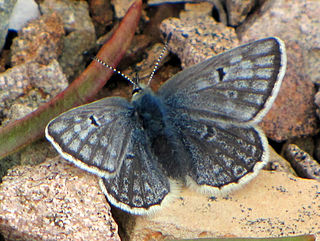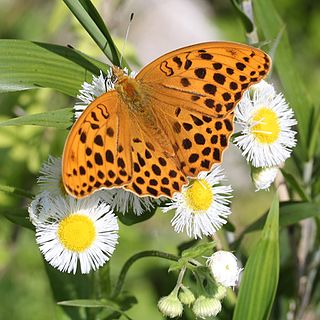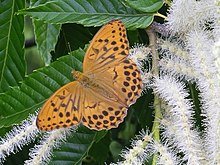
The silver-washed fritillary is a common and variable butterfly found over much of the Palearctic realm – Algeria, Europe and across the Palearctic to Japan.

The pearl-bordered fritillary is a butterfly of the family Nymphalidae found in Europe and through Russia across the Palearctic to the north of Kazakhstan.

The dark green fritillary is a species of butterfly in the family Nymphalidae. The insect has a wide range in the Palearctic realm - Europe, Morocco, Iran, Siberia, Central Asia, China, Korea, and Japan.

The Queen of Spain fritillary is a butterfly of the family Nymphalidae.

Euchloe ausonia, the eastern dappled white, is a southern European and Palearctic butterfly found mostly to the south and east of its almost indistinguishable relative the western dappled white.

Graphium doson, the common jay, is a black, tropical papilionid (swallowtail) butterfly with pale blue semi-transparent central wing bands that are formed by large spots. There is a marginal series of smaller spots. The underside of wings is brown with markings similar to upperside but whitish in colour. The sexes look alike. The species was first described by father and son entomologists Cajetan and Rudolf Felder.

Miletus symethus, the great brownie, is a small butterfly found in India that belongs to the lycaenids or blues family. The species was first described by Pieter Cramer in 1777.

The Indian fritillary is a species of butterfly of the nymphalid or brush-footed family. It is usually found from south and southeast Asia to Australia.

Horaga albimacula, the violet onyx, is a species of lycaenid or blue butterfly found in the Indomalayan realm.

Parnassius tenedius, the tenedius Apollo, is an east Palearctic member of the snow Apollo genus (Parnassius) of the swallowtail family (Papilionidae). Populations range from Siberia and the Far East of Russia to the western Chukchi Peninsula, Mongolia and north China. The larva feeds on Corydalis species. In the northern part of its range it is a low altitude butterfly; further south it is montane.

Argynnis pandora, the cardinal, is a butterfly of the family Nymphalidae. It is common throughout southern Europe and is also found in northern Africa and the Middle east and then east across the Palearctic to the Tian-Shan andnorthwestern India.

Boloria dia, the Weaver's fritillary or violet fritillary, is a butterfly in the family Nymphalidae. The name Weaver's fritillary is in honor of Richard Weaver, an English insect collector who claimed to have obtained the specimen within ten miles of Birmingham around 1820. However, B. dia is very rare in England and the few specimens known from there are thought to be from possibly accidental introductions.

Brenthis ino, the lesser marbled fritillary, is a butterfly of the family Nymphalidae.

Agriades glandon, the Arctic blue or Glandon blue, is a species of butterfly in the family Lycaenidae. It in found in Eurasia and North America.

Boloria pales, the shepherd's fritillary, is a butterfly of the family Nymphalidae. It is found from the Cantabrian Mountains and the Pyrenees through the Alps and Apennine Mountains east to the Balkan, Carpathian Mountains, the Caucasus and central Asia up to western China.

Argynnis is a genus of butterflies in the family Nymphalidae, one of several groups known as "fritillaries".

Elymnias nesaea, the tiger palmfly, is a butterfly in the family Nymphalidae.

Issoria eugenia is a small butterfly found in the East Palearctic that belongs to the family Nymphalidae.

Argynnis anadyomene is a butterfly found in the East Palearctic that belongs to the browns family.



















